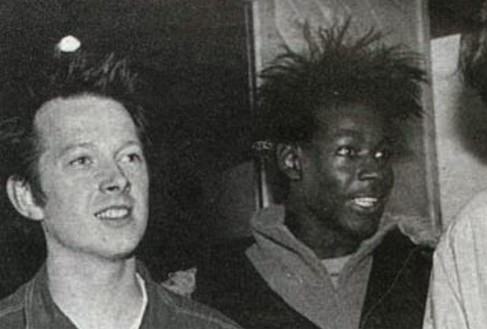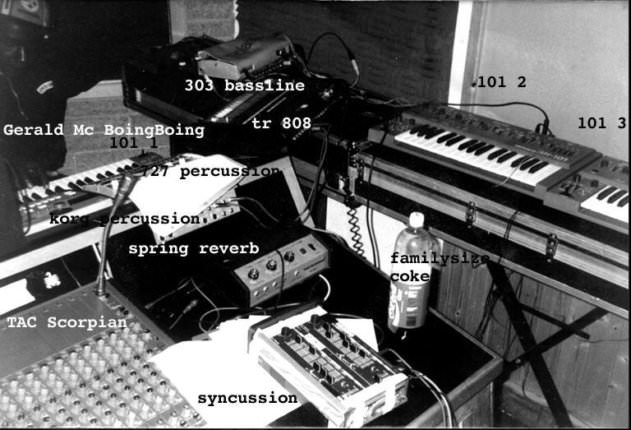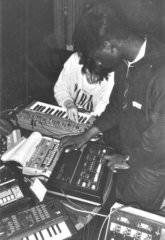What do you think of young producers wanting to copy the sounds from old records?
Gerald: For some reason they’ve got the impression that the old school stuff sounds better somehow. I’m someone that’s progressed all the way from analogue synths through digital into samplers and then to computers. I can’t really agree with people who think the old analogue stuff automatically sounds better. One of the secrets of working with this stuff is to make your own individual sounds. I’ve been analysing some of the younger kids and I reckon there’s a few people who think all you have to do is switch on the old analogue machines and press play and you sound like you’re from the old school.
I know one person who’s just spent something like eight grand and got the entire TR series and all the old Roland stuff. He reckons he got a bargain. I went round and listened and it sounds like crap. Like, ‘You’re just making a load of noises!’ It doesn’t just work like that. Back in the day – if one can say that – the people who were inspiring me were using the synths to try and make real-life sounds. It was a good exercise to learn how to shape waveforms. I get the impression that most younger producers think all you have to do is buy one of these old synths and plug it in. You’ve got to be a little bit more inventive.
If you’re gonna spend all that money on something that actually isn’t really worth that much, you should do something different with it. I feel like I’ve heard all these analogue acid house sounds before. I had this dream back then, like, we’re doing all this acid house now, what’s it gonna sound like in the year 2000? I thought by now we’d have some ultra-new, crazy sounds, not something that sounds like it’s 25 years old. I’m still waiting for us to get past that stage.
Do you think it’s positive that people still want to reference those old sounds though?
Graham: I have conversations with younger people all the time about the culture of it all. It’s come back round so many times and I think it’ll keep coming back. There’s a certain quality of record that’s indestructible. If DJs are playing a mixture of old and new stuff, quality comes to the surface. Looking back to old Nu Groove records or Detroit techno stuff, it’s become classic. It has its own history now and it’s easy to dig back into that with the internet. So yeah, I approve of people studying the history of it and looking at the feel of those records, trying to find new ways of making emotional responses from computers.
But it’s also a lot easier to make electronic music these days. It was a considerable investment in our day to start making that kind of music. It’s much more accessible now but the trick is to make your records stand out. Often it’s not about putting more things into the record but about particular feels and getting that sensibility to make a real standout record. It’s all down to feelings.
I think it’s a really good move to look back towards what all the original records were about. It was all about atmosphere in clubs, it wasn’t about mixing one record into another. The novelty of that wore out in about ’91. Everything sounded really generic and the tempos were all the same. It just got really boring quite quickly.
Gerald, after what you said on your blog recently we have to ask your thoughts on live dance music at the moment.
Gerald: Yeah… I think, er… I think I’m still imagining that people are really dancing and they’re not off their heads. I’m really into the idea of people really listening to what’s going on and reacting to it, not just holding their hands up in the air when I hold my hands in the air. It’s almost like there’s a kind of pseudo… a false thing going on. People go out and seem to enjoy it but I find it really hard to pretend like that. When I’m playing live I’m really doing it. If I’m doing a tune and it’s not being appreciated I can change it round there on the spot.
DJing’s a totally different game. It’s simpler but it’s still enjoyable, kind of like the difference between taking a photograph and painting a picture. I’m kind of getting to grips with the whole DJ vibe now.
What, after 25 years?
Gerald: I’ll get it one day.
Yeah, maybe if you keep plugging away and putting in the hours
Gerald: Haha. Yeah…
In terms of people who are doing something genuinely live with live dance music, what do you think of the current artists whose live shows are very much in the spirit of the old school all-hardware approach? You’re performing alongside Simian Mobile Disco on Saturday, for instance, and some of the younger guys like Karenn are very much in that same vein.
Graham: I think it’s quite different in that it’s addressing dancefloor issues. With Rebuild we’re not particularly about making a record, if you know what I mean. When you see Simian Mobile Disco they’re playing their hits and there’ll be familiar music that you’ve heard DJs play. With Rebuild it’s kind of one step removed from that. Anything can happen. It’s almost like a return to an innocence. It’s a room full of people and you’ve got to make them do something.
So, finally, are there any plans to record a Rebuild set and make it available to people?
Graham: It’s not something we’ve discussed really. I think the minute you start thinking of it in those terms you start thinking about it differently. It’s not out of the question, but I think the throwaway nature of it’s kind of an important thing at the moment. It’s all by the skin of its teeth.
Graham and Gerald perform Rebuild Live Acid Jam at Simian Mobile Disco and WANG presents Delicatessen, Fire, Vauxhall, London this Saturday (the 27th of October). Tickets are available from Fire.




03.00 PM
great interview!
09.36 PM
Loved the Rebuild live this weekend at XOYO!!